 Money is always greener from a distance. 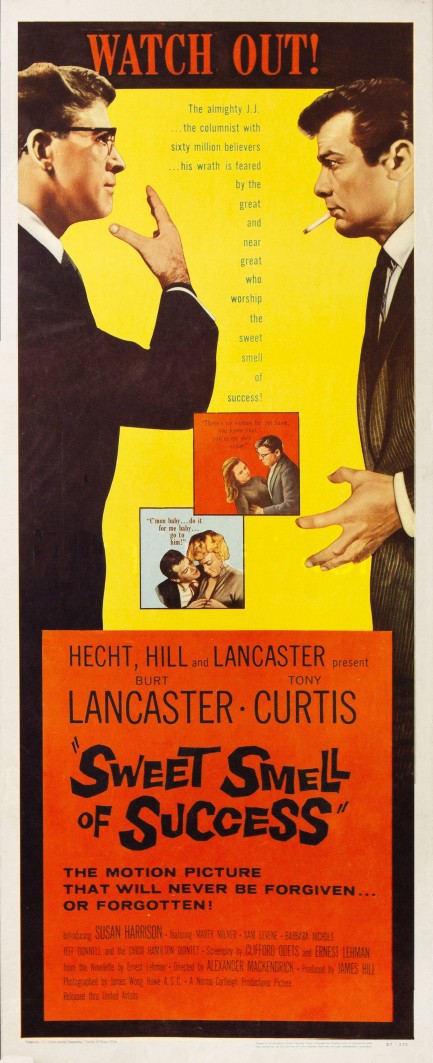
Sweet Smell of Success was a mandatory watch for us. It's considered by many to be a top film noir but we'd never seen it. Well, that's been rectified now, and what a good expenditure of time it was. Tony Curtis plays a New York City publicity agent whose business is falling apart because he's been blacklisted by the most important newspaper columnist in the country, played by Burt Lancaster. Why the rough treatment? Lancaster's sister is dating a jazz musician and he wants the relationship ended. He's trying to force Curtis to do the dirty work—smear the guy, frame him, whatever, just get him out of the picture. Curtis's desperation to climb to the top ranks of agents leads him to try breaking up the pair, but in film noir sleazy decisions have a way of pushing goals farther away rather than drawing them nearer.
Sweet Smell of Success, which had a special premiere in New York City in June 1957, and went into national release a week later, which was today, has a feel similar to another Big Apple drama—the excellent 2019 movie Uncut Gems. Both movies are very fast paced, even borderline chaotic, as desperate bottom-dwellers try to climb to the top of a dog-eat-dog industry while keeping one step ahead of karmic fate. Sweet Smell of Success is the better film largely thanks to Lancaster in one of the all-time heel roles. You'll want to punch his character J.J. Hunsecker—nice, right?—directly in the middle of his face. And you'll want to give Curtis a shaking fit to rattle his teeth. Anything to wake him up to the fact that in a cutthroat game, the most important thing isn't having a razor but lacking a conscience. Noir fans should push this one to the head of the queue. 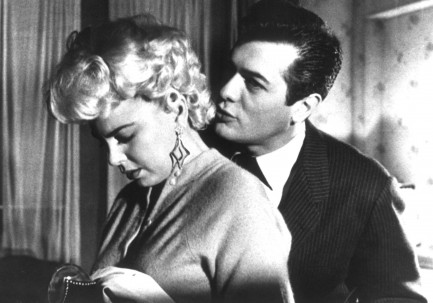 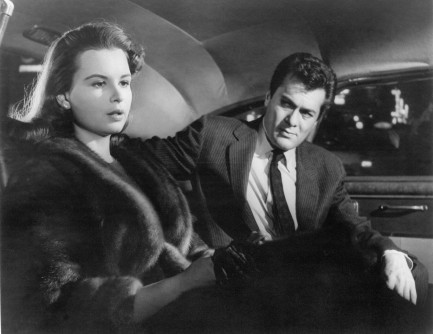 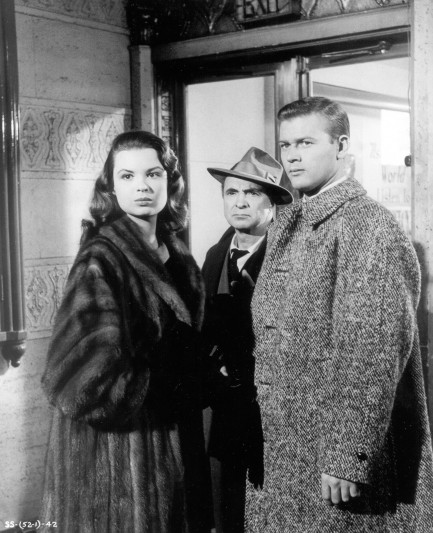 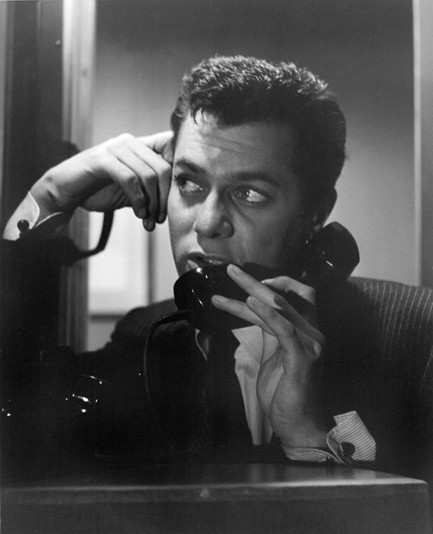 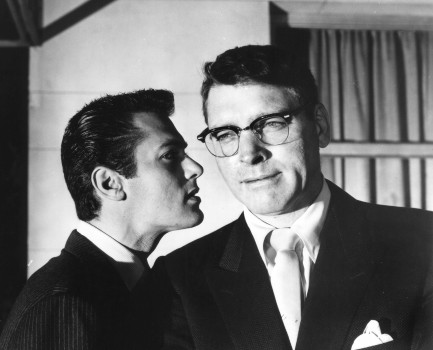 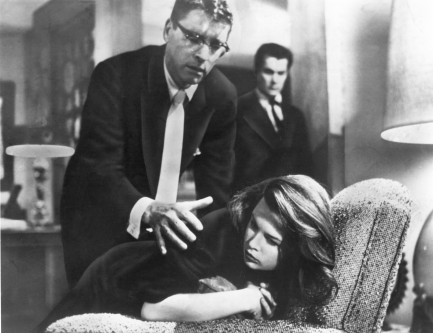 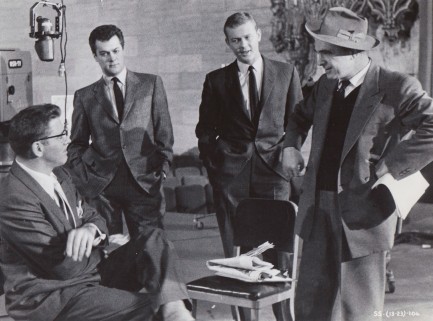 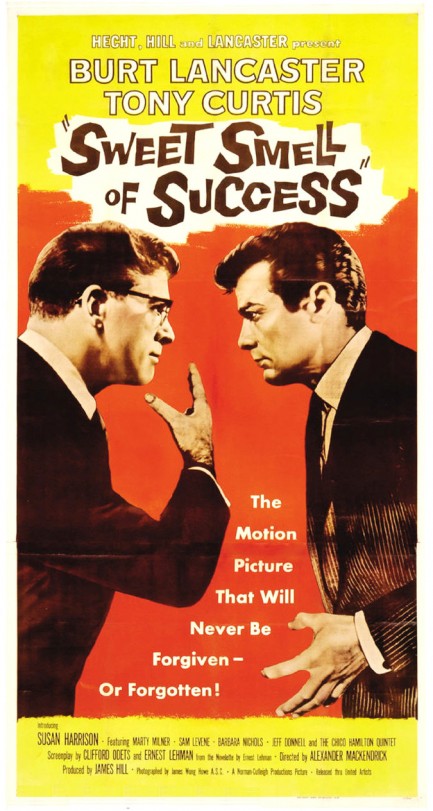
 Who's afraid of him? Nobody anymore. 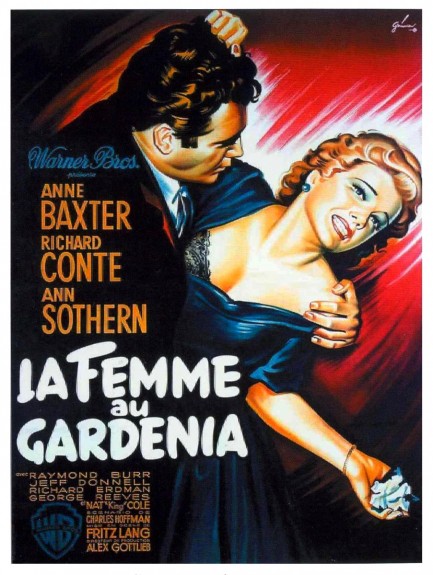
Isn't this a great poster? It was painted for La femme au gardénia, better known as The Blue Gardenia. Every once in a while you come across an old movie that's so ahead of its time you can't believe what you're seeing. This one is about a woman's response to sexual coercion, and law enforcement's reaction to the aftermath. Basically, Anne Baxter, who's five-three and a buck twenty, ends up in the apartment of Raymond Burr, who's six feet and goes at least 230. Burr plies Baxter with booze, and when he later tries to get her horizontal a struggle ensues and he ends up dead. Baxter escapes the apartment, and thanks to the arrival of a very efficient cleaning lady nearly all the evidence of her presence is accidentally erased the next morning before Burr's body is discovered.
So Baxter's scot-free? Well, not quite. There's that whole guilt, edginess, and fear thing, which her roommates notice. And there are a few bits of evidence, which lead to police drawing ever closer. All these are good plot moves. Lacking an identity for the killer, the press begins calling her—the bit of evidence that exists indicates it's a her—the Blue Gardenia, which is a clear Black Dahlia echo. We liked that. And we also liked that, at this point, the film was a thriller built wholly around consent and power. But this was the 1950s. Of course they weren't trying to impart that lesson. What were we thinking? Instead, an ending so pat that it almost ruins the movie comes blundering over the horizon. Is it wrong to suggest watching the first 75 minutes of this and turning it off?
Okay, the movie isn't completely trashed by the ending. It's just that we thought we had something daring on hand, and in reality it's a decent-not-great semi-noir from Fritz Lang that flirts with feminism but decides not to close the deal. However, the story was derived from a novella by author and playwright Vera Caspary, and we can't help wondering if the suits overruled her on a different ending. Probably not, but we'll have to dig that tale up and read it anyway. Regardless, we think the movie is worth watching just for Anne Baxter's bravura performance. And we love the platinum poodle cut she sports too. Plus there's Nat King Cole as, presumably, himself. The Blue Gardenia opened in the U.S. in 1953, and premiered in France today in 1954 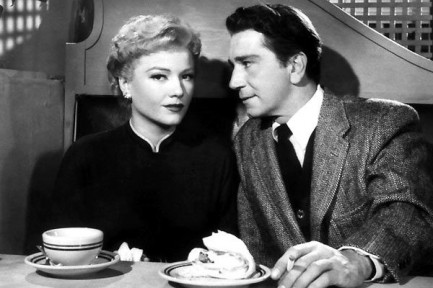 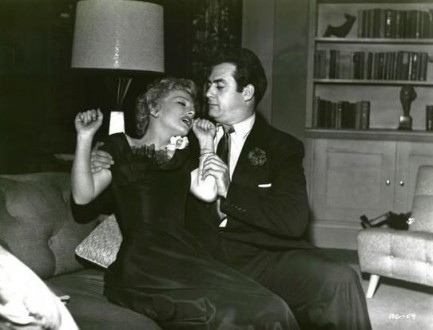 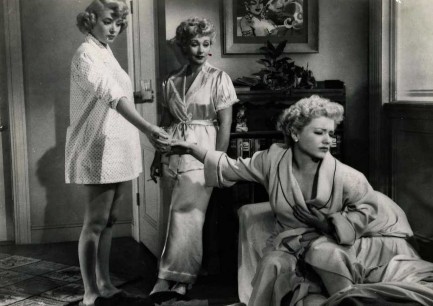 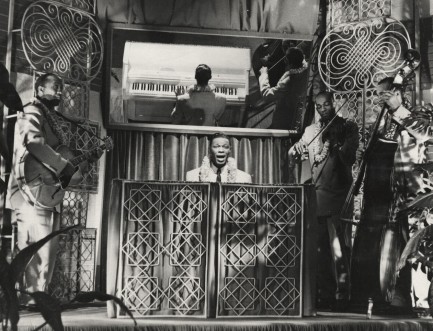 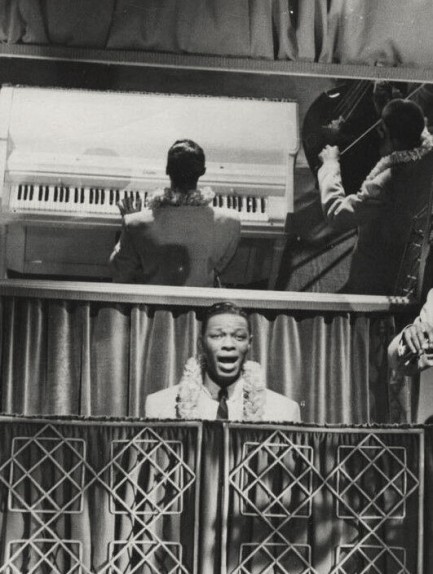 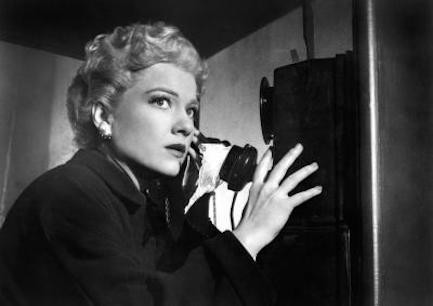 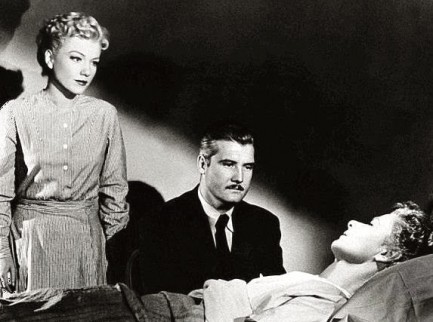 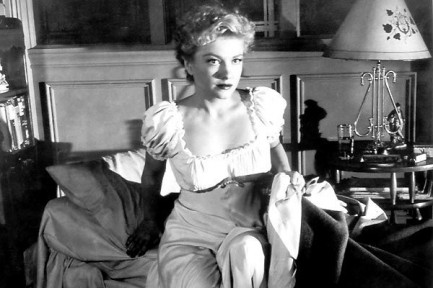
 In Hollywood a good name is half the battle. 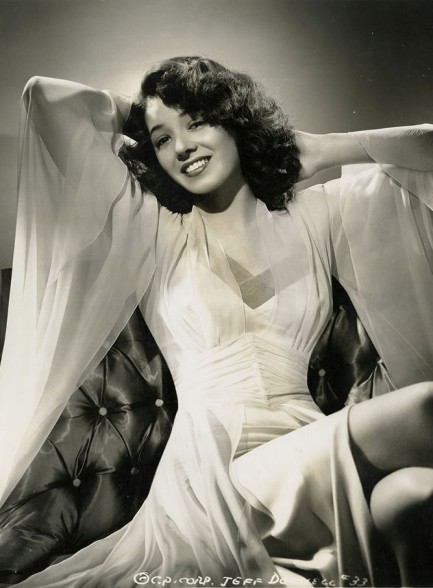
She had one of the most memorable monikers in Hollywood history. She appeared in more than sixty films, scores of television shows, and probably a couple of dozen television movies too, and all without very much in the way of serious studio push. She did have a contract with Columbia Pictures, but many of her appearances were uncredited. Nevertheless she worked steadily for forty years, which a lot of bigger stars can't say. She was born Jean Marie Donnell but she acted as Jeff Donnell—not a name you'd easily forget—and this photo shows her in 1942.
 Nothing's harder to rewrite than a lie. 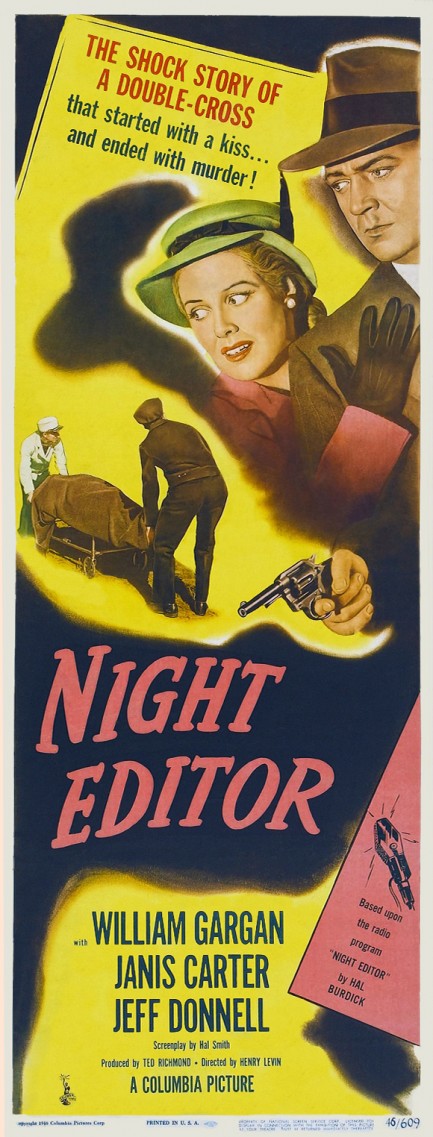
This simple but effective poster was made to promote the simple but effective film noir Night Editor, starring William Gargan, Janis Carter, and Jeff Donnell. A group of grizzled reporters arrayed around a poker game reminisce over past scoops, with one of the group eventually telling the story of Tony Cochrane, a cop who got himself in too deep with a dame. A dissolve to the past takes viewers to the cop's world, and the narrative is broken up by occasional returns to the smoky poker game, where the storyteller punctuates his tale with a bit of Monday morning quarterbacking. The story is that Cochrane the cop, who was cheating on his wife with a beautiful society woman, was parked one night at a secluded beach when he and his lover witnessed a murder. But fearing exposure of their affair, he neither stops the killing, nor pursues the killer, and later actively tampers with evidence to hide his own presence at the murder scene. You know this is going nowhere good, but just how complicated the mess becomes is where the fun lies. Low budget, but reasonably entertaining, Night Editor premiered in the U.S. today in 1946.
|
 |

The headlines that mattered yesteryear.
1939—Holiday Records Strange Fruit
American blues and jazz singer Billie Holiday records "Strange Fruit", which is considered to be the first civil rights song. It began as a poem written by Abel Meeropol, which he later set to music and performed live with his wife Laura Duncan. The song became a Holiday standard immediately after she recorded it, and it remains one of the most highly regarded pieces of music in American history. 1927—Mae West Sentenced to Jail
American actress and playwright Mae West is sentenced to ten days in jail for obscenity for the content of her play Sex. The trial occurred even though the play had run for a year and had been seen by 325,000 people. However West's considerable popularity, already based on her risque image, only increased due to the controversy. 1971—Manson Sentenced to Death
In the U.S, cult leader Charles Manson is sentenced to death for inciting the murders of Sharon Tate and several other people. Three accomplices, who had actually done the killing, were also sentenced to death, but the state of California abolished capital punishment in 1972 and neither they nor Manson were ever actually executed. 1923—Yankee Stadium Opens
In New York City, Yankee Stadium, home of Major League Baseball's New York Yankees, opens with the Yankees beating their eternal rivals the Boston Red Sox 4 to 1. The stadium, which is nicknamed The House that Ruth Built, sees the Yankees become the most successful franchise in baseball history. It is eventually replaced by a new Yankee Stadium and closes in September 2008.
|

|
|

It's easy. We have an uploader that makes it a snap. Use it to submit your art, text, header, and subhead. Your post can be funny, serious, or anything in between, as long as it's vintage pulp. You'll get a byline and experience the fleeting pride of free authorship. We'll edit your post for typos, but the rest is up to you. Click here to give us your best shot.

|
|




























































































